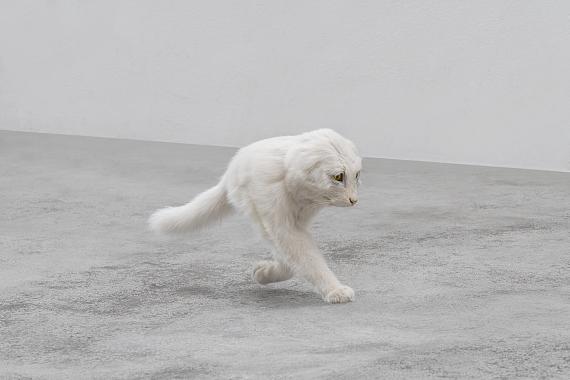
Photo: Delfino Sisto Legnani
© Eva & Franco Mattes
Eva & Franco Mattes »
Dear Imaginary Audience
Exhibition: 23 Jan – 24 May 2021
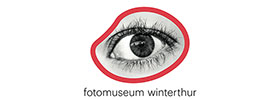
Fotomuseum Winterthur
Grüzenstr. 44+45
8400 Winterthur
+41 (0)52-2341060
info@fotomuseum.ch
www.fotomuseum.ch
Tue, Thu, Fri 11-17; Wed 11-20; Sat-Sun 11-18
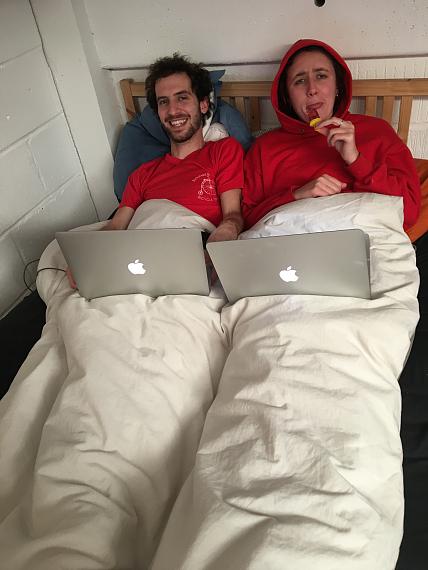
© Eva & Franco Mattes
Eva & Franco Mattes
"Dear Imaginary Audience"
Exhibition: 23 January – 24 May 2021
Eva & Franco Mattes (both b. 1976) have been investigating the internet’s effects on the ethics and politics of our daily lives since the 1990s, reflecting on how networked images increasingly interfere with and define our private and social behaviour. In the process, the artist duo dissects the opaque mechanisms of our networked society, its infrastructures and morally dubious forms of online behaviour.
From the controversial censorship mechanisms of internet giants and the questionable effects of the so-called gig economy to our own complicity as viewers – in Dear Imaginary Audience, Eva & Franco Mattes shed light on the networked image and its various processes of production, circulation and consumption, all the while holding up a mirror to the viewer in a manner that is at once unsparing and darkly humorous. Their first monographic exhibition in the museum context, including new works created for the purpose, reveals a profound change in our visual culture connected to the impact of digital networks on our habitual ways of communicating and of using photography.
Eva & Franco Mattes’s tongue-in-cheek exploration of internet phenomena includes two taxidermic cat sculptures, one of them unobtrusively poking its tiny stuffed head out from the ceiling and the other appearing as a two-legged cat with no ears. Referring to the social practice of lolcat memes, their Ceiling Cat (2016) and Half Cat (2020) are based on two memes that circulated on the net under these names: one became a symbol for the internet that sees and monitors everything, while the other tracks and exposes the complex process of image manipulation. Shared and copied by millions of users, constantly on the move and constantly manipulated, these cat memes are metaphors par excellence for the internet. By immortalising them as rigidified sculptures, Eva & Franco Mattes interfere with the circulation process to highlight the repercussions of the networked image’s reproductive feature.
Hannah Uncut (2021), a new work commissioned by Fotomuseum Winterthur for the exhibition and collection, demonstrates how our mobile devices have grown into private image archives. In the spring of 2020, Eva & Franco Mattes published an open call online, offering to pay US$ 1,000 to anyone willing to sell their smartphone complete with all the pictures on it, with the vendor, in turn, handing over an unedited slice of their life and opening it up to the interpretation of strangers. They selected Hannah, a British woman of about thirty, giving us the chance to get to know her and follow her personal development over the course of a decade. Ultimately, Hannah’s pictures bring home to us the digital evolution of the last ten years and the photographic forms of communication and enactment associated with it: Hannah uses screenshots as a matter of course just as she applies face filters to her selfies. Her photographs, personal and yet tailored to an imaginary online audience, inevitably catapult us into the role of voyeurs.
BEFNOED (By Everyone, For No One, Every Day; 2014–) demonstrates how the circulation of images on social media not only influences our behaviour but also makes us complicit in the attention economy. For this screen-based installation, Eva & Franco Mattes outsourced various jobs to anonymous workers and provided them with detailed instructions directing them to perform absurd actions and document them with webcams. What is exposed here, first of all, is the capitalist sadism of the gig economy, in which minor, short-term jobs are outsourced to self-employed contractors or those in marginal employment, as is the case with services like Uber or food-delivery couriers. But the work goes further, putting our complicity as viewers in the spotlight and urging us to critically reflect on our own participation in the exploitative global (image) economy. This dimension of the work is further enhanced by the arrangement of the screens in the exhibition space: like the gig economy workers, visitors have to strain, stretch and bend to consume the videos.
The Bots (2020), a work that delves into the shadowy business of censorship in the form of content moderation, will also be on display for the first time. Content moderators are workers who are hired by internet service providers like Facebook or Twitter to clean all the violent, pornographic and morally dubious content off their platforms. These jobs are often contracted out to external companies in developing and emerging economies, where the operatives work for low wages. The installation comprises three videos that offer a behind- the-scenes glimpse of the curious routines of three content moderators working for Facebook in Berlin. To protect the identity of the informants and ensure that the sensitive insider content is not prey to censorship itself, the interviews are disguised as make-up tutorials.
Dear Imaginary Audience, addresses you and me – and all the viewers we imagine and envision beyond those who actually see the images we circulate online and appreciate them with a "like" or "share". But it also addresses the very real effects, both private and social, of our online image consumption, as well as our own complicity in an exploitative capitalist chain that we help feed through our participation as viewers. It is mechanisms and infrastructures that are largely hidden from sight that control the world of images today – and in which Eva & Franco Mattes critically intervene.
Eva & Franco Mattes (both b. 1976, Brescia, Italy) live and work in New York, USA. In 2016 they received the Creative Capital Award. Their recent solo and group shows include What Has Been Seen, Phi Foundation for Contemporary Art, Montreal, CAN (2020), Snap and Share: Transmitting Photographs from Mail Art to Social Networks, SFMOMA, San Francisco, USA (2019); Happens or It Didn’t Pic, Blueproject Foundation, Barcelona, ES (2018/19); I Was Raised on the Internet, Museum of Contemporary Art Chicago, USA (2018); Biennale für aktuelle Fotografie, Mannheim, DE (2017); The World Without Us, Hartware Medienkunstverein, Dortmund, DE (2016/17); 20. Biennale of Sydney, AU (2016); Electronic Superhighway, Whitechapel Gallery, London, GB (2016).
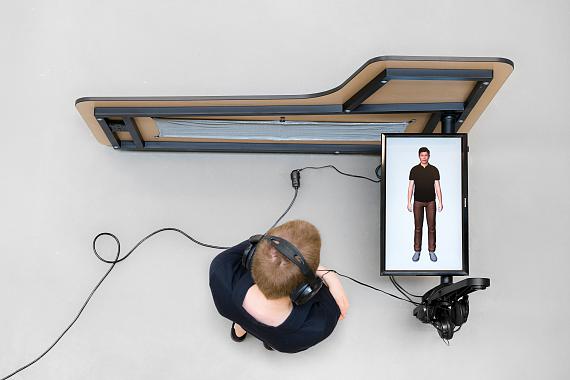
Photo: Tom Janssen
© Eva & Franco Mattes
Eva & Franco Mattes
"Dear Imaginary Audience"
Ausstellung: 23. Januar bis 24. Mai 2021
Eva & Franco Mattes (beide *1976) untersuchen bereits seit Mitte der 1990er-Jahren die Auswirkungen des Internets auf unser Leben, und reflektieren mitunter, wie online zirkulierende Bilder zunehmend unser privates und soziales Verhalten mitbestimmen. Dabei analysiert das künstlerische Duo die undurchsichtigen Prozesse, Infrastrukturen und moralisch fragwürdigen Verhaltensformen unserer vernetzten Gesellschaft.
Seien es die umstrittenen Zensurmechanismen von Internetgiganten, die fragwürdigen Auswirkungen der sogenannten Gig Economy, sowie unsere eigene Komplizenschaft als Zuschauer_innen: In Dear Imaginary Audience, beleuchten Eva & Franco Mattes das vernetzte Bild und dessen Prozesse der Produktion, der Zirkulation, sowie des Bildkonsums – wobei sie unserem Online-Verhalten den Spiegel schonungslos und doch mit einem Augenzwinkern vorhalten. An der ersten musealen Einzelausstellung von Eva & Franco Mattes mit neuen, für die Ausstellung entstandenen Arbeiten, lässt sich ein tiefgreifender sozio-technologischer Wandel unserer visuellen Kultur nachvollziehen, der sich auf unser Kommunikationsverhalten, unsere fotografischen Nutzungsgewohnheiten und unsere Selbst- und Weltbilder auswirkt.
Zeitgenössische Netzphänomene beleuchten Eva & Franco Mattes mitunter mit einer guten Prise schwarzem Humor. So haben sie beispielsweise über die Arbeiten Ceiling Cat (2016) und Half Cat (2020) zwei berühmte gleichnamige Memes als taxidermische Katzenskulpturen verewigt – eine aus einem Loch in der Decke herabschauende Katze als Symbol des alles überwachenden Internets, und eine deformierte zweibeinige Katze ohne Ohren, die die komplexen Prozesse der Bildmanipulation nachverfolgt und offenlegt. Die massenhaft zirkulierenden Bildkopien der Katzen-Memes, die in ständiger Bewegung sind, zigfach geteilt werden und so zum Ausdruck des Internets schlechthin geworden sind, werden von Eva & Franco Mattes als skulpturale Momentaufnahmen eingefroren und in ihrer Wirkungskraft beleuchtet.
Um das Anwachsen unserer Smartphones zu privaten Bildarchiven geht es in der neu für die Ausstellung entstandenen Arbeit Hannah Uncut (2021): Im Frühjahr 2020 hatten Eva & Franco Mattes online dazu aufgerufen, ihnen ein Smartphone samt aller darin enthaltenen Bilder für 1’000 USD zu verkaufen – und damit ein Kapitel eines Lebens uneditiert (engl. uncut) als Kunstwerk zugänglich zu machen und der Fremdinterpretation auszuliefen. Die Wahl fiel auf das Smartphone von Hannah, einer um die 30 Jahre alten Frau aus Grossbritannien, deren Persönlichkeit und Entwicklung wir über ein Jahrzehnt entdecken und mitverfolgen können. An Hannahs Bildern lässt sich die digitale Entwicklung und die damit einhergehenden fotografischen Kommunikations- und Inszenierungsformen der letzten zehn Jahre ablesen: Wie selbstverständlich nutzt Hannah Screenshots oder versieht ihre Selfies mit Gesichtsfiltern. Ihre Bilder, persönlich und doch manchmal auch für ein imaginäres Online-Publikum erstellt, zwingen uns zwangsläufig in die Rolle der Voyeur_innen.
Dass zirkulierende Bildinhalte auf Sozialen Medien nicht nur einen Einfluss auf unser Verhalten haben, sondern wir durch sie auch zu Kompliz_innen der Aufmerksamkeitsökonomie werden, führt das Werk BEFNOED (2014–; By Everyone, For No One, Every Day) vor Augen. Für die Arbeit haben Eva & Franco Mattes über das Internet verschiedene Aufträge an anonyme Arbeitskräfte vergeben und sie absurde Handlungen ausführen und mit Webcams dokumentieren lassen. Vorgeführt wird hier nicht nur der kapitalistische Sadismus der sogenannten Gig Economy, bei der kleinere, zeitlich befristete Aufträge an unabhängige Selbständige oder geringfügig Beschäftigte ausgelagert werden, unter anderem über Plattformen wie Uber oder Essenslieferservices. Auch unsere Komplizenschaft als Betrachter_innen und damit unsere eigene Teilhabe an
ausbeuterischen Prozessen wird uns gespiegelt – nicht zuletzt über die Anordnung der Bildschirme im Ausstellungsraum, durch welche sich die Besucher_innen ähnlich wie die Auftragsarbeitenden recken, strecken und bücken müssen, um die Videos zu konsumieren.
Erstmals präsentiert wird auch die installative Arbeit The Bots (2020), die sich dem Zensur-Business rund um die sogenannten Content Moderator_innen widmet: von Internetdienstleistern wie Facebook oder Twitter angestellte Arbeitskräfte, welche sich durch die von Nutzer_innen hochgeladenen Inhalte (engl. content) klicken und das Netz von gewaltvollem, pornografischem, anstössigem und moralisch fragwürdigem Material säubern. Oft sind sie anonym über externe Firmen in Entwicklungs- und Schwellenländern angestellt und arbeiten zum Niedriglohn. Die Installation umfasst drei Videos, die auf Insider-Informationen von Content Moderator_innen des Facebook-Unternehmens in Berlin beruhen und Episoden aus deren kuriosen Arbeitsalltag offenlegen – getarnt als Make-Up-Tutorials, um nicht selbst der Zensur anheimzufallen.
Dear Imaginary Audience, adressiert nicht nur Sie und mich – und alle jene Zuschauer_innen, die wir uns vorstellen, einbilden und die tatsächlich die Bilder, die wir im Netz zirkulieren, eines Blickes, Likes oder Shares würdigen – sondern auch die ganz realen privaten und sozialen Auswirkungen unseres Online-Bildkonsums, in deren kapitalistischen Wertschöpfungskette wir über das Zuschauen zu Kompliz_innen ausbeuterischen Verhaltens werden. Es sind die Mechanismen und Infrastrukturen im meist unsichtbaren
Hinter- und Untergrund, die die Bilderwelt, in der wir leben, steuern – und in die Eva & Franco Mattes eingreifen, um sie gleichsam zu sezieren und kritisch zu beleuchten.
Eva und Franco Mattes (beide *1976, Brescia, Italien) leben und arbeiten in New York, USA.
Im Jahr 2016 wurden sie mit dem Creative Capital Award ausgezeichnet. Zu ihren jüngsten Einzel- und Gruppenausstellungen gehören u.a. What Has Been Seen, Phi Foundation for Contemporary Art, Montreal, CAN (2020), Snap and Share: Transmitting Photographs from Mail Art to Social Networks, SFMOMA, San Francisco, USA (2019); Happens or It Didn’t Pic, Blueproject Foundation, Barcelona, ES (2018/19); I Was Raised on the Internet, Museum of Contemporary Art Chicago, USA (2018); Biennale für aktuelle Fotografie, Mannheim, DE (2017); The World Without Us, Hartware Medienkunstverein, Dortmund, DE (2016/17); 20. Biennale von Sydney, AU (2016); Electronic Superhighway, Whitechapel Gallery, London (2016).
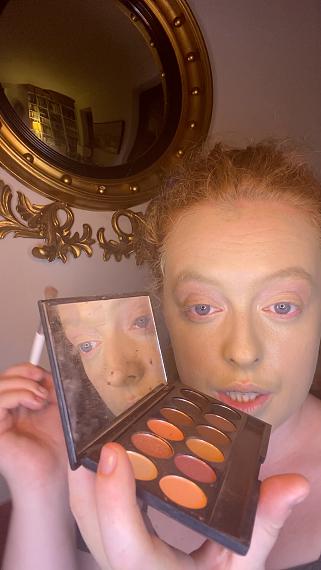
© Eva & Franco Mattes
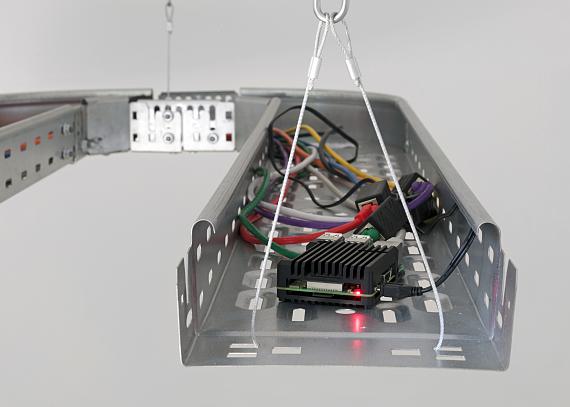
installation view Team Gallery, Los Angeles, 2019
Photo: Jeff McLane © Eva & Franco Mattes